Eleven-year-old Iraqi, Mooz, yearns to taste the bananas that have been made unavailable by warfare.
Effects of war
Soul Lanterns
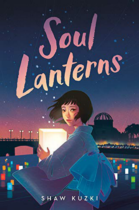
Twelve-year-old Nozomi lives in the Japanese city of Hiroshima. She wasn’t even born when the bombing of Hiroshima took place. Every year Nozomi joins her family at the lantern-floating ceremony to honor those lost in the bombing. People write the names of their deceased loved ones along with messages of peace, on paper lanterns and set them afloat on the river. This year Nozomi realizes that her mother always releases one lantern with no name. She begins to ask questions, and when complicated stories of loss and loneliness unfold, Nozomi and her friends come up with a creative way to share their loved ones’ experiences. By opening people’s eyes to the struggles they all keep hidden, the project teaches the entire community new ways to show compassion.
Boy, Everywhere
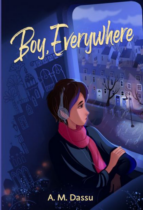
Sami loves his life in Damascus, Syria. He hangs out with his best friend playing video games; he’s trying out for the football team; he adores his family and gets annoyed by them in equal measure. But his comfortable life gets sidetracked abruptly after a bombing in a nearby shopping mall. Knowing that the violence will only get worse, Sami’s parents decide they must flee their home for the safety of the UK.
What The Kite Saw
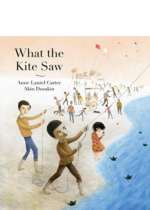
Without his father and brother, the young boy’s life is turned upside down. He and his family have to stay inside, along with everyone else in town. At suppertime, he can’t stop looking at the two empty places at the table and his sister can’t stop crying. The boy looks out the window and is chilled to see a tank’s spotlight searching the park where he plays with his friends. He hears shouts and gunshots and catches sight of someone running in the street — if only they could fly away, he thinks.
The Cat I Never Named:a true story of love, war, and survival
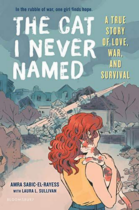
In 1992, Amra was a teen in Bihac, Bosnia, when her best friend said they couldn’t speak anymore. Her friend didn’t say why, but Amra knew the reason: Amra was Muslim. It was the first sign her world was changing. Then Muslim refugees from other Bosnian cities started arriving, fleeing Serbian persecution. When the tanks rolled into Bihac, bringing her own city under seige, Amra’s happy life in her peaceful city vanished.
War Is Over
It’s 1918, and war is everywhere. John’s father is fighting in the trenches far away in France, while his mother works in a menacing munitions factory just along the road. His teacher says that John is fighting, too, that he is at war with enemy children in Germany. One day, in the wild woods outside town, John has an impossible moment: a dreamlike meeting with a German boy named Jan. John catches a glimpse of a better world, in which children like Jan and himself can one day scatter the seeds of peace. David Almond brings his ineffable sensibility to a poignant tale of the effects of war on children, interwoven with David Litchfield’s gorgeous black-and-white illustrations.
War Stories
Twelve-year-old Trevor Firestone loves playing war-based video games and he idolizes his great-grandfather Jacob who came home from World War II a celebrated hero; now ninety-three Jacob wants to retrace his journey in memory and reality and return to the small French village that his unit liberated, and Trevor is going with him–but not everyone in the town want Jacob to come, and Trevor is going to learn an important lesson: real war is not a video game, and valor and heroism can be very murky concepts.
Idriss’s Marble
“When war threatens their home, Idriss and his mother must flee. He clutches his lucky charm–a single marble–throughout their journey, walking over hazardous terrain, crawling under barbed wire, and sailing on a fragile little boat. Will the marble’s luck help them avoid capture and bring them to the safety of a new world?”
The Cat Man Of Aleppo
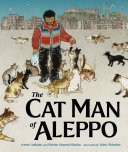
The courageous and true story of Mohammad Alaa Aljaleel, who in the midst of the Syrian Civil War offered safe haven to Aleppo’s abandoned cats. Aleppo’s city center no longer echoes with the rich, exciting sounds of copper-pot pounding and traditional sword sharpening. His neighborhood is empty–except for the many cats left behind. Alaa loves Aleppo, but when war comes his neighbors flee to safety, leaving their many pets behind. Alaa decides to stay–he can make a difference by driving an ambulance, carrying the sick and wounded to safety. One day he hears hungry cats calling out to him on his way home. They are lonely and scared, just like him. He feeds and pets them to let them know they are loved. The next day more cats come, and then even more! There are too many for Alaa to take care of on his own. Alaa has a big heart, but he will need help from others if he wants to keep all of his new friends safe.
The Cat Man of Aleppo is a WOW Recommends: Book of the Month for May 2021.
Call Me American
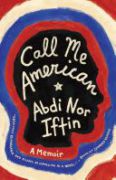
Abdi Nor Iftin first fell in love with America from afar. As a child, he learned English by listening to American pop artists like Michael Jackson and watching films starring action heroes like Arnold Schwarzenegger. When U.S. marines landed in Mogadishu to take on the warlords, Abdi cheered the arrival of these real Americans, who seemed as heroic as those of the movies. Sporting American clothes and dance moves, he became known around Mogadishu as Abdi American, but when the radical Islamist group al-Shabaab rose to power in 2006, it suddenly became dangerous to celebrate Western culture. Desperate to make a living, Abdi used his language skills to post secret dispatches to NPR and the Internet, which found an audience of worldwide listeners. But as life in Somalia grew more dangerous, Abdi was left with no choice but to flee to Kenya as a refugee. In an amazing stroke of luck, Abdi won entrance to the U.S. in the annual visa lottery, though his route to America was filled with twists and turns and a harrowing sequence of events that nearly stranded him in Nairobi. Now a proud resident of Maine and on the path to citizenship, Abdi Nor Iftin’s dramatic, deeply stirring memoir is truly a story for our time: a vivid reminder of why western democracies still beckon to those looking to make a better life.
